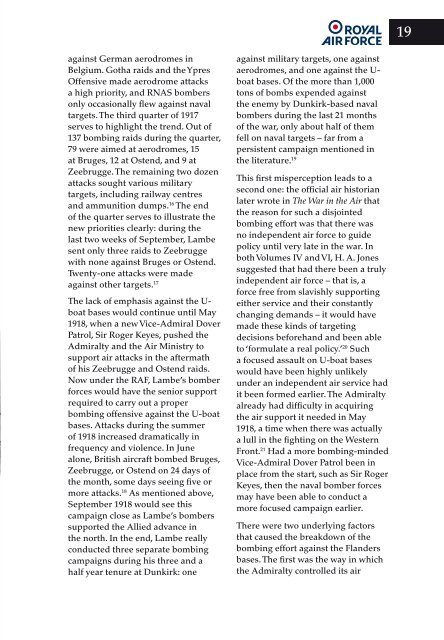You also want an ePaper? Increase the reach of your titles
YUMPU automatically turns print PDFs into web optimized ePapers that Google loves.
against German aerodromes in<br />
Belgium. Gotha raids and the Ypres<br />
Offensive made aerodrome attacks<br />
a high priority, and RNAS bombers<br />
only occasionally flew against naval<br />
targets. The third quarter of 1917<br />
serves to highlight the trend. Out of<br />
137 bombing raids during the quarter,<br />
79 were aimed at aerodromes, 15<br />
at Bruges, 12 at Ostend, and 9 at<br />
Zeebrugge. The remaining two dozen<br />
attacks sought various military<br />
targets, including railway centres<br />
and ammunition dumps. 16 The end<br />
of the quarter serves to illustrate the<br />
new priorities clearly: during the<br />
last two weeks of September, Lambe<br />
sent only three raids to Zeebrugge<br />
with none against Bruges or Ostend.<br />
Twenty-one attacks were made<br />
against other targets. 17<br />
The lack of emphasis against the Uboat<br />
bases would continue until May<br />
1918, when a new Vice-Admiral Dover<br />
Patrol, Sir Roger Keyes, pushed the<br />
Admiralty and the <strong>Air</strong> Ministry to<br />
support air attacks in the aftermath<br />
of his Zeebrugge and Ostend raids.<br />
Now under the RAF, Lambe’s bomber<br />
forces would have the senior support<br />
required to carry out a proper<br />
bombing offensive against the U-boat<br />
bases. Attacks during the summer<br />
of 1918 increased dramatically in<br />
frequency and violence. In June<br />
alone, British aircraft bombed Bruges,<br />
Zeebrugge, or Ostend on 24 days of<br />
the month, some days seeing five or<br />
more attacks. 18 As mentioned above,<br />
September 1918 would see this<br />
campaign close as Lambe’s bombers<br />
supported the Allied advance in<br />
the north. In the end, Lambe really<br />
conducted three separate bombing<br />
campaigns during his three and a<br />
half year tenure at Dunkirk: one<br />
against military targets, one against<br />
aerodromes, and one against the Uboat<br />
bases. Of the more than 1,000<br />
tons of bombs expended against<br />
the enemy by Dunkirk-based naval<br />
bombers during the last 21 months<br />
of the war, only about half of them<br />
fell on naval targets – far from a<br />
persistent campaign mentioned in<br />
the literature. 19<br />
This first misperception leads to a<br />
second one: the official air historian<br />
later wrote in The War in the <strong>Air</strong> that<br />
the reason for such a disjointed<br />
bombing effort was that there was<br />
no independent air force to guide<br />
policy until very late in the war. In<br />
both Volumes IV and VI, H. A. Jones<br />
suggested that had there been a truly<br />
independent air force – that is, a<br />
force free from slavishly supporting<br />
either service and their constantly<br />
changing demands – it would have<br />
made these kinds of targeting<br />
decisions beforehand and been able<br />
to ‘formulate a real policy.’ 20 Such<br />
a focused assault on U-boat bases<br />
would have been highly unlikely<br />
under an independent air service had<br />
it been formed earlier. The Admiralty<br />
already had difficulty in acquiring<br />
the air support it needed in May<br />
1918, a time when there was actually<br />
a lull in the fighting on the Western<br />
Front. 21 Had a more bombing-minded<br />
Vice-Admiral Dover Patrol been in<br />
place from the start, such as Sir Roger<br />
Keyes, then the naval bomber forces<br />
may have been able to conduct a<br />
more focused campaign earlier.<br />
There were two underlying factors<br />
that caused the breakdown of the<br />
bombing effort against the Flanders<br />
bases. The first was the way in which<br />
the Admiralty controlled its air<br />
19

















